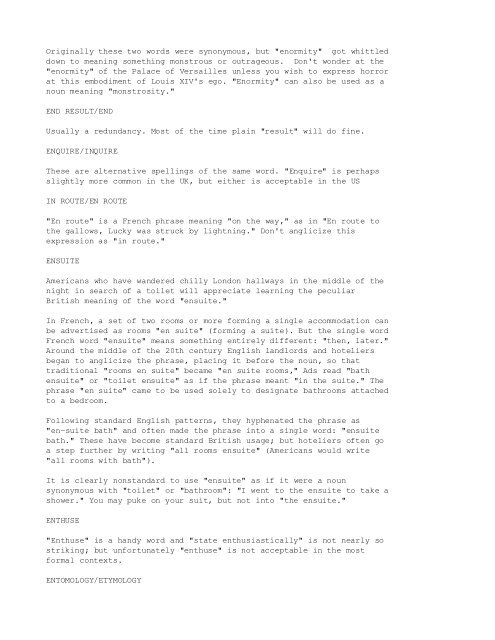Common_Errors_in_English_usage
Common_Errors_in_English_usage
Common_Errors_in_English_usage
Create successful ePaper yourself
Turn your PDF publications into a flip-book with our unique Google optimized e-Paper software.
Orig<strong>in</strong>ally these two words were synonymous, but "enormity" got whittled<br />
down to mean<strong>in</strong>g someth<strong>in</strong>g monstrous or outrageous. Don't wonder at the<br />
"enormity" of the Palace of Versailles unless you wish to express horror<br />
at this embodiment of Louis XIV's ego. "Enormity" can also be used as a<br />
noun mean<strong>in</strong>g "monstrosity."<br />
END RESULT/END<br />
Usually a redundancy. Most of the time pla<strong>in</strong> "result" will do f<strong>in</strong>e.<br />
ENQUIRE/INQUIRE<br />
These are alternative spell<strong>in</strong>gs of the same word. "Enquire" is perhaps<br />
slightly more common <strong>in</strong> the UK, but either is acceptable <strong>in</strong> the US<br />
IN ROUTE/EN ROUTE<br />
"En route" is a French phrase mean<strong>in</strong>g "on the way," as <strong>in</strong> "En route to<br />
the gallows, Lucky was struck by lightn<strong>in</strong>g." Don't anglicize this<br />
expression as "<strong>in</strong> route."<br />
ENSUITE<br />
Americans who have wandered chilly London hallways <strong>in</strong> the middle of the<br />
night <strong>in</strong> search of a toilet will appreciate learn<strong>in</strong>g the peculiar<br />
British mean<strong>in</strong>g of the word "ensuite."<br />
In French, a set of two rooms or more form<strong>in</strong>g a s<strong>in</strong>gle accommodation can<br />
be advertised as rooms "en suite" (form<strong>in</strong>g a suite). But the s<strong>in</strong>gle word<br />
French word "ensuite" means someth<strong>in</strong>g entirely different: "then, later."<br />
Around the middle of the 20th century <strong>English</strong> landlords and hoteliers<br />
began to anglicize the phrase, plac<strong>in</strong>g it before the noun, so that<br />
traditional "rooms en suite" became "en suite rooms," Ads read "bath<br />
ensuite" or "toilet ensuite" as if the phrase meant "<strong>in</strong> the suite." The<br />
phrase "en suite" came to be used solely to designate bathrooms attached<br />
to a bedroom.<br />
Follow<strong>in</strong>g standard <strong>English</strong> patterns, they hyphenated the phrase as<br />
"ensuite bath" and often made the phrase <strong>in</strong>to a s<strong>in</strong>gle word: "ensuite<br />
bath." These have become standard British <strong>usage</strong>; but hoteliers often go<br />
a step further by writ<strong>in</strong>g "all rooms ensuite" (Americans would write<br />
"all rooms with bath").<br />
It is clearly nonstandard to use "ensuite" as if it were a noun<br />
synonymous with "toilet" or "bathroom": "I went to the ensuite to take a<br />
shower." You may puke on your suit, but not <strong>in</strong>to "the ensuite."<br />
ENTHUSE<br />
"Enthuse" is a handy word and "state enthusiastically" is not nearly so<br />
strik<strong>in</strong>g; but unfortunately "enthuse" is not acceptable <strong>in</strong> the most<br />
formal contexts.<br />
ENTOMOLOGY/ETYMOLOGY





